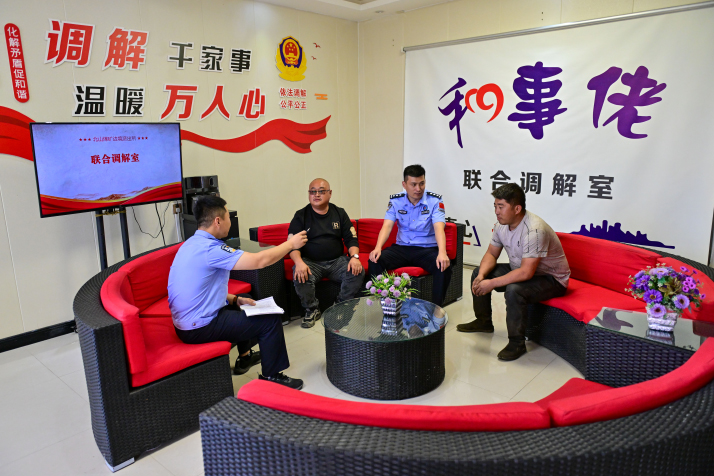| Xinjiang Today |
| Beyond the courtroom | |
|
|
 A mediator (left) with the Women's Federation of Shuimogou District, Urumqi, mediates a family dispute in May 2024 (VCG)
Xinjiang Uygur Autonomous Region has implemented a new legal framework aimed at addressing social conflicts, part of broader efforts to reinforce governance in the multiethnic region. The Regulations on Diversified Resolution of Conflicts and Disputes, which took effect on March 1, establish a multi-tiered system to resolve disputes through mediation, legal channels and interagency collaboration.
Spanning six chapters and 52 articles, the legislation formalizes mechanisms to involve government bodies, community organizations, and individuals in managing grievances. It is intended to form a cornerstone of social governance, designed to create a sustainable, interconnected framework that integrates prevention, mediation and oversight.  Officers help resolve a dispute in a mediation room at a police station in Qitai County, Changji Hui Autonomous Prefecture, in September 2024 (XINHUA)
A collaborative framework It is essential to promote diverse methods of resolution of conflicts and disputes as well as cooperation between leadership organizations and responsible entities. Government agencies, social organizations, enterprises, community self-governing bodies and other entities must work under the comprehensive planning and coordination of leadership organizations at all levels. The regulations emphasize the need to uphold and develop the Fengqiao Experience in the new era. The Fengqiao Experience is a model of grassroots social governance that originated in Fengqiao Town in Zhejiang Province, emphasizing mediation and dispute resolution at the local level to prevent conflicts from escalating. The goal is to strengthen the social governance system that involves Party leadership, government responsibility, democratic consultation, social cooperation, public participation, legal guarantees and technological support. The regulations mandate establishing sound mechanisms for diversified conflict resolution and risk prevention, with conflict resolution platforms operating under the supervision of leading bodies at all levels. The emphasis is shifting from a court-centric approach to one led by these leading bodies, integrating diversified conflict resolution into broader grassroots social governance. Strengthening mediation organizations in border areas is crucial, as it allows for the lawful resolution of disputes related to frontier residents, border tourism and border trade. This collective effort will create synergies in preventing and resolving conflicts. Individuals seeking help from related departments expect solutions, not procedural delays. To avoid ineffective processes and the creation of further disputes, it is important to clearly define the roles and responsibilities of each stakeholder. At the county level and above, governments should incorporate diversified conflict resolution into their rule of law development plans. Township and sub-district governments should establish sound mediation mechanisms. Courts should coordinate litigation and non-litigation methods to resolve disputes, providing guidance, mediation and judicial confirmation of mediation agreements. Procuratorates (prosecuting agencies) should establish mechanisms for participating in conflict resolution, building closer ties between prosecutors and mediators and strengthening public interest litigation, criminal and civil reconciliation, and substantive resolution of administrative disputes. Public security bureaus (police) should establish mechanisms for criminal case reconciliation and mediation of disputes related to public security cases and traffic accident compensation. Justice departments should strengthen guidance and supervision of non-governmental mediation, administrative mediation and industry-specific mediation, promoting the participation of law firms, legal aid agencies, notary services and arbitration institutions in diversified conflict resolution. Public complaints and proposals offices should maintain open channels for petitions and establish linkages with agencies providing mediation, arbitration, administrative adjudication, and litigation, handling petitions through legal channels and resolving conflicts promptly and lawfully. Other related departments should resolve specific conflicts within their respective domains. Grassroots self-governing organizations, social organizations, labor dispute arbitration bodies, rural land contract arbitration bodies and commercial arbitration bodies should also fulfill their respective responsibilities in conflict resolution. Notably, the regulations specify that industry associations, chambers of commerce and social service organizations can establish commercial mediation organizations to provide market-oriented services in areas such as investment, finance, insurance, engineering contracts, technology transfer, intellectual property and international trade. Interconnected actions Diversified conflict resolution necessitates prioritizing conflict prevention and non-litigious mechanisms. The regulations outline the legal status of source prevention, risk assessment, investigation and early warning, analysis and judgment, and psychological services, addressing issues at the front end, conducting research, and promoting conflict resolution at its source. The regulations encourage parties to prioritize cost-effective, efficient and relationship-restoring non-litigation methods, shifting the focus from litigation to early resolution. Fairness, efficiency and effectiveness must be reflected. Harmony, a value that the Chinese hold dear, implies reconciliation. Mediation organizations can mediate upon application by the parties, proactively offer mediation or accept referrals for mediation, unless a party refuses mediation. Public security bureaus can guide parties to reconcile or mediate criminal cases that meet the conditions for criminal reconciliation, as well as disputes related to public security cases and traffic accident compensation that can be mediated. Procuratorates can suggest that parties resolve disputes through reconciliation or mediation during the handling of criminal cases and public interest litigation cases. Courts should inform parties of litigation risks and guide them to choose appropriate methods of resolution for civil and commercial and administrative disputes. Courts can organize mediation or entrust mediation organizations to conduct mediation; if mediation fails, they should adjudicate according to the law. For civil and commercial cases that have already been filed, mediation can be conducted with the consent of the parties. Administrative organs, invited mediators, and full-time court mediators can be entrusted to conduct mediation; if mediation fails, a judgment should be made according to the law. Likewise, commercial arbitration bodies can guide parties to reconcile or mediate before making a ruling on a dispute. The key to resolving disputes lies in ensuring that the rights and responsibilities of all parties are balanced. By relying on the public and connecting multiple parties to conduct reconciliation and mediation, the goal is to help parties find common ground and achieve a satisfactory resolution. Two-way drive Resilient social governance requires strict adherence to rules. Mediation is not about compromising principles; respect for the law, legality and compliance with public order and good practices are prerequisites. If a mediation organization or mediator discovers that a party is acting in bad faith, harming public interests or infringing on the legitimate rights and interests of a third party, the mediation should be terminated, with the reasons for termination to be recorded. Mediation agreements are not just empty words; the regulations specify that parties who reach a mediation agreement can apply to a competent court for judicial confirmation or to a notary office for notarization to grant a debt instrument compulsory enforcement effect. Conflict resolution entities should supervise and revisit the implementation of reconciliation and mediation agreements, urging and confirming that the parties fulfill their obligations and promoting the implementation of the agreements. The sustainable operation of diversified conflict resolution requires systematic guarantees. In terms of funding, governments at all levels should establish a diversified conflict resolution funding guarantee mechanism commensurate with economic development and incorporate conflict resolution funding into their fiscal budgets. Lawfully established mediation organizations can provide market-oriented commercial mediation services in specified areas. In terms of personnel, governments and related departments at all levels should strengthen the construction of mediator teams in townships (sub-districts) and villages (communities) and can develop full-time mediators through government procurement of services. Mediators should be hired through multiple channels and provided with corresponding material guarantees. Their personal safety should also be guaranteed. In terms of platform and information system guarantees, leading bodies for diversified conflict resolution at all levels should promote the construction of comprehensive service platforms and the integration of related conflict resolution information systems to strengthen the sharing of information. In terms of supervision and management, regulations should standardize the management system for mediators to hold certificates, avoid conflicts of interest and be subject to penalties. Lists of mediation organizations and mediators should be established and made public, and conflict resolution entities should consciously accept social supervision. Those who fail to establish a working mechanism, fulfill their responsibilities or resolve conflicts in a timely manner, resulting in serious consequences, will be held accountable according to the law. The author is the dean of the Law School of Xinjiang University. This article was first published in newspaper Xinjiang Daily Comment to maxiaowen@cicgamericas.com |
|
||||||||||||||||||||||||||||
|